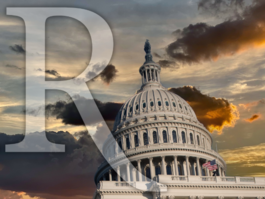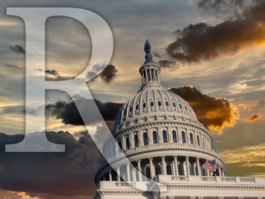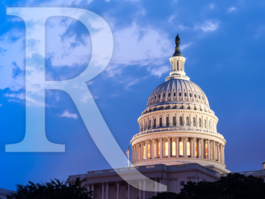Hey, Conservatives, We're Recovering
A Commentary By Lawrence Kudlow
Believe it or not, sometimes good news on the economy can be bad news for stocks.
It's a distant point, but one worth considering in view of conservative pessimism over Obama's plans to spend, tax, borrow and control the economy. I share these worries. But the U.S. is still a free-market economy, and it will be so at least until the health care and energy sectors are nationalized. And free-market economies are resilient and self-correcting.
While so-called spending-and-deficit stimulus may be an economic depressant, Friedmanite monetary stimulus -- which has been substantial -- is gradually exerting a powerful impact on economic growth. At the same time, businesses have become lean and mean, with radical cost-cutting of inventories, employment and hours worked. That's setting up a big profits surge, which is the biggest economic stimulus of all.
Consumers also have retrenched, as is appropriate with falling home prices, a rough stock market correction and a slowdown of incomes. But from the ashes of recession, these corrective forces lead to the next recovery.
In Hayekian and von Misean terms, bad investment and spending decisions are being remedied through the free-market corrective process. And greased by easy money, today's market correctives may produce a much stronger V-shaped recovery than the stock market consensus expects.
That's the message of this week's blowout manufacturing report from the Institute of Supply Management. The ISM index rose for the eighth-straight month, climbing to 52.9 in August from 48.9 in July, with 11 of 18 industries reporting growth. (Anything over 50 is a clear recovery sign, meaning the recession almost certainly ended in June.) At this pace, there could be 4 percent growth in real gross domestic product for the third quarter.
Within the index, new business orders soared to 64.9 (the highest level since December 2004), production jumped to 61.9, and vendor performance improved to 57.1. This last statistic is important since vendor performance tracks supplier deliveries. When economic conditions heat up, deliveries tend to slow down. Think of Amazon delivering books a day or two later when orders are rapidly rising. And with inventories now at rock-bottom levels, businesses are going to have to rehire workers in order to reignite the production process and meet new demand.
Four percent growth is a lot lower than the 7 percent to 8 percent growth one would expect after a deep recession. That was the robust expansion pace we witnessed in 1983-84. But 4 percent growth becomes a V in light of pessimistic forecasts of 1 percent or 2 percent growth, or even a double-dip recession.
Now here's the rub for stocks: It may be that the Federal Reserve is caught flat-footed in the event of a V-shaped recovery. It may have to tighten policy sooner than planned.
Economist Brian Wesbury, who agrees with the V-shaped scenario, points out that the consumer price index is rising at a 2.4 percent annual rate for the first seven months of 2009. This is a more difficult inflation story than the 12-month change, where we are still deflating nearly 2 percent off of last year's $150 oil shock. So overly aggressive Fed easing, combined with a weakening dollar, may be generating more inflation pressures than our central bankers think.
There's a supply-side angle to this story, too. Top marginal tax rates are scheduled to rise in 2011, reducing incentives for future economic growth. However, investors and producers are likely to beat the tax hike by bringing income and activity forward to 2010. This could create a false prosperity next year, which will reinforce the V-shaped recovery even while economic activity is drained from 2011 (possibly setting up a quasi-double-dip). Something similar happened in 1992-93, ahead of the Bill Clinton tax hikes.
So back to stocks. Tuesday's sell-off -- with the Dow dropping more than 150 points -- could reflect the market's recognition that the Fed will have to raise interest rates sooner, and withdraw excess cash more quickly, than the easy-money consensus had expected.
A lot of people disagree with this point of view, but I am putting it out there for consideration. It's not unusual in a stock market/business-cycle recovery to have new production processes absorb excess liquidity while the Fed is withdrawing money from the financial system. That often sets up a brief stock market correction, even though the rise in profits will ultimately carry the indexes to higher levels.
Conservatives need to take note of all this. Disagreements with Obamanomics are vitally important, even in the early stages of economic recovery. But my sense is the right is too pessimistic about today's economy. Sometimes you have to take your political lenses out in order to clearly examine the internal corrective workings of a free-market system.
Down the road, heavy government control of the economy will diminish our potential to grow. But that doesn't mean we must call a halt to the business cycle.
COPYRIGHT 2009 CREATORS.COM
See More Commentary by Lawrence Kudlow
See Other Political Commentary
Views expressed in this column are those of the author, not those of Rasmussen Reports.
Rasmussen Reports is a media company specializing in the collection, publication and distribution of public opinion information.
We conduct public opinion polls on a variety of topics to inform our audience on events in the news and other topics of interest. To ensure editorial control and independence, we pay for the polls ourselves and generate revenue through the sale of subscriptions, sponsorships, and advertising. Nightly polling on politics, business and lifestyle topics provides the content to update the Rasmussen Reports web site many times each day. If it's in the news, it's in our polls. Additionally, the data drives a daily update newsletter and various media outlets across the country.
Some information, including the Rasmussen Reports daily Presidential Tracking Poll and commentaries are available for free to the general public. Subscriptions are available for $4.95 a month or 34.95 a year that provide subscribers with exclusive access to more than 20 stories per week on upcoming elections, consumer confidence, and issues that affect us all. For those who are really into the numbers, Platinum Members can review demographic crosstabs and a full history of our data.
To learn more about our methodology, click here.



